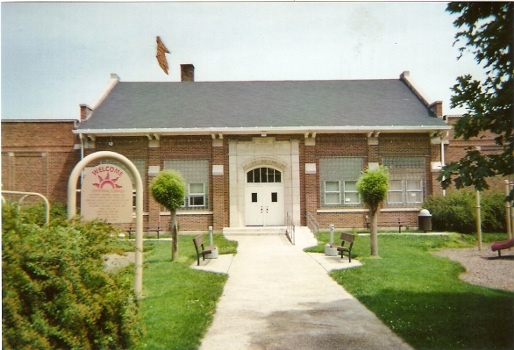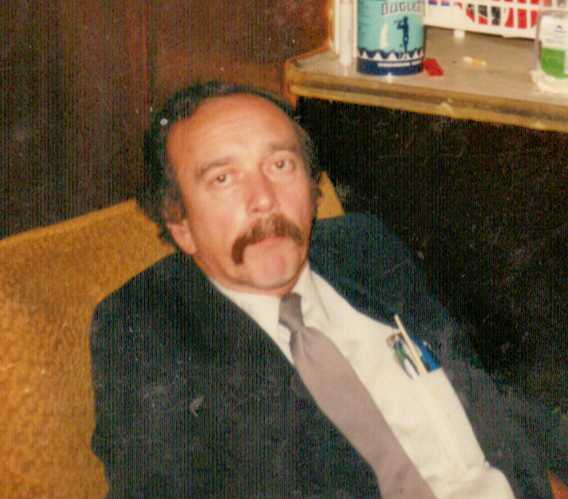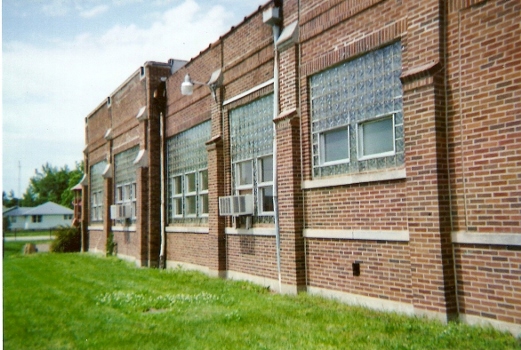Few individuals are aware of an event occurring on the
morning of a frigid and snowy day during November of a year during the
1980's. I shall do my best to relate this strange experience so that
the reader might have reasons to ponder into the subject of unexplainable
phenomena. Not a day passes that I am not for a time in thoughts of that uncanny episode.

Waggoner Grade School in 2008.The school is now called The Waggoner Centennial Building. That school
was closed for student attendance in the 1980's.
September 19,2011/monitor/Wilma
Waggoner,Illinois is a tiny village of less than one hundred fifty people and also the home of several dogs and cats. I wouldn't have had a town without them. Located just off highway 55 between Springfield and Alton, its school
served children in grades one through four but was closed during the late 1980's
for reason of heating costs. That school is an elegant brick structure built about 1914. I was employed there as an itinerant teacher from 1967-1990. Working with small groups of children in grades one through four, I moved from the Waggoner-Raymond area in 1994 carrying with me a positive
attitude in regard to that part of rural America.Providing instruction for the children of farmers and those supporting a farm based economy, that school district was dominated by wonderful students and parents supportive of an educational program strong in both discipline and academics. Panhandle Unit #2 was a fantastic school district.
My story begins with a kind of still life portrait of a man named Arthur Volsen. Arthur was district maintenance man and had suffered a serious injury during WWII combat in the European theatre. Carrying a metal fragment in his
left side near a kidney, surgery could not be performed for removal
of that scrapnel without endangering his life. A time came that Volsen needed employment requiring light duties. Fortunate for the school district, him and me, and several other entities
was that Arthur's expertise in several important areas made him the school district's first choice when a maintenance position became available. One might
speculate and philosophize that throughout history certain humans have been placed in order to avert disasters as the one facing Waggoner, Illinois.
My part in that episode commences with my arrival at the Waggoner Grade School parking lot and exiting
my automobile. Smacked imediately in my face by snow flurries and a chilling
wind as a banana pie perfectly aimed, I took aim at the front entrance and began a courageous entry.
First to reach my workplace, the time was around 7:30 A.M.
But there was no manner of preparing phychologically for what occurred during the next hour. Events that followed defy ones imagination- an incredible quirk if such can be defined as a twisted and out of focus series of things that happen.
Walking hurriedly toward the usual warmth of Waggoner Grade School and turning the entrance
lock, I entered and proceeded toward the room number four- my assigned teaching space for that year. Heated by a coal fired boiler housed in that school's basement, Waggoner Grade School was usually comfortably warm during such frigid days, but noticed immediately was that the heating system was out of whack. Air within the school on that day was very nearly as frigid as that outside.
As far as the facilities were concerned, a gymnasium, third grade, fourth grade, library, kitchen, theatrical stage, office, and hall ways leading to what was called
the annex were heated by a huge coal burning furnace. Cost of coal was the primary consideration in the decision to later close that school to student attendance.
But
important for development of this account is that there was a new addition to Waggoner Grade School. As one exited a gymnasium through a hallway on its east side, one entered through a hallway to reach the annex. The annex contained two rooms- one first grade and one second. Those two rooms were a trouble source for
that snowy, frigid November day during year 1989. That area was heated with modern
propane burning furnaces- some of the best available for those times.
Placing a box of teaching materials on the floor in room #4, I headed towards the
boiler room to check on Robert McClean, the custodian. He might
know why there was no heat. As soon as I entered a hallway leading to the annex, a smell of propane gas confronted me. Backing out of there immediately and heading for a telephone, and from a tiny office, I placed a phone call to a Mr. Howard Hartke at Farmersville. He served as principal at both Waggoner Grade School and Farmersville Grade School. His main office was at the latter where he also taught eighth grade.
Important to note is that Waggoner Grade School had indoor carpets in its classrooms.That school was notorious for production of static electrical charges. On colder
days, one could walk the hardwood floor of the gymnasium and then enter into a carpeted room where he might receive a significant electrical shock simply by touching any metal object. A build up of propane gas fumes within an
area could have caused an immediate explosion because of static electricity. But fortunately, so far as was known, the propane gas fumes had been confined to the annex and the hallway leading to that area.
Speaking to Principal Howard Hartke by phone brought immediate results. "I'll get
Art Volsen over there right away!"
"I'll stand by until he arrives and hold open the entrance door just a crack," I said.
On that cold day during November of the 1980's, none of
the usual heating systems were working. The kitchen where Gladys
Bollman prepared school lunches, the stoves were without pilot lights; requiring lighting by match. A water heater in the school's basement was electric. Fortunate indeed is that no pilot lights were burning that day. Toward averting an explosion of propane gas fumes that fact was beneficial.
Gladys Bollman would not arrive until 8:30 A.M. And by that time, all teachers and students would have been in their classrooms.
Propane gas fumes were lurking in the annex hallways and within two classrooms within that part of Waggoner Grade School. Danger of that gas exploding lay in static electrical charges that might act as torches to produce an explosion.
Why no fire had been started in the coal burning boiler that day is yet a mystery to me, and where was Robert McClain, the school's custodian? Had Bob become overcome by fumes in an effort to stop the propane leak? Finding his absence a source of anxiety, I stood by until Art Volsen, the district maintenance
man arrived less than fifteen minutes following the telephone call I had made. No propane fumes had reached the gymnasium or four classrooms in the old section of Waggoner Grade School so far as I know.
Upon his arival, Art grasped the situation and placed telephone calls to local and Farmersville fire departments. "We have a dangerous situation here." He said. "Waggoner must be evacuated, and block all traffic on HW 55 at the
Farmersville and Raymond exits. We have a propane gas leak here at Waggoner Grade School, and there two large tanks of that gas sitting fifty yards behind us. There could be an explosion at any time. God help us!"

(Reflections:9-18-2011/A cloudy, cool, and raining September day during year 2011. Scheduled Tuesday for dental surgery with Dr. Balen, a long time acquaintenace. I'm reminded that much is to be said of older building such as that grade school where I taught school. Somewhere and somehow with such structures as that may be stored memories of each other. In my mind and through my composition, I enjoy speculating that perhaps all of those memories are in some manner stored and can, in the not too distant future, be brought back through the super photography stored with the central nervous systems of those living and deceased who shared those times together. By overlaying, by remembering and perpetuating the highlites of those times we shared; both positive and negative. Electrons, protons, and neutrons..)
Compounding that danger was that natural gas lines and meters were scattered all over Waggoner.
Then, with his tools secured within his wraparound apron, Art Volsen pinched his nostrils, held his breath, and trod gallantly down the hallway and into the area from which propane fumes were emerging and accumulating.
Upon his return, Art walked to the entrance of room four where I had been standing in anticipation. His oral communication was of a kind I've experience often during perilous times. Words taken seriously. Words never forgotten. Words that test ones faith. People shouldn't do that to me.
"George," said Art. "I found out what the trouble is. The fumes are leaking from the heater in Mrs. Leonard's second grade classroom. We've really got problems. The pilot light went out there, and the automatic shut off didn't work. The fumes are coming out, and I mean steadily. I want to ask you. Do you believe in a hereafter? You and me both may go pretty soon."
"I don't know, Art," I replied.
Then Art said: "I do believe there's a hereafter. I hope this is not the time that I'll enter it, but I'm ready if it is. Here I go to try and stop it."
As a passive and observing participant during that fifteen minutes of an Earth hour, I was in a somewhat frozen state much as it had been during The Okefenokee Swamp Hurricane and its wildfire and facing a military firing squad for reason that
a low grade military officer stumbled, and his right knee touched ground. I've often assumed that posture admidst troubled times. Just as Arthur Volsen, I was ready. The book of life is finished from beginning to its end. I cannot change it.
And then, just at the appropriate moment, there came chance, destiny, and good fortune. One may define such a twist in plan and plot, whatever term is subject to whatever anyone wishes. Quirk is a good word.
From out of where ever stood a man whose attire was a black suit, black tie and white shirt, and shoes to match. Short in stature, he appeared somewhat like a G-man. His manner of speaking was urgent and business like as he pointed and jestured
in the presence of Arthur Volsen and me.
"You two have problems here!" he exclaimed. "I'm here to help you if I can! If you don't do as I say, you may not get out of this alive!"
To Arthur Volsen, our visitor proclaimed: "Take that wrench you have there, exit this building through that door there as fast as you can! Hurry out to the propane tanks and shut the valves off there!"
I stood and listened intently as Art responded: "There is no exit through that way, sir! There is no doorway! I have to go through the hallway and rear exit!"
"Don't argue with me now! There's not time! There is a doorway out of that room, but it will stay open for just a short time! Be sure that you hurry! You need to come back into this building that way too!"

As our visitor, helper, advisor observed, Art Volsen disappeared into the entry of Miss Dianne Benrensymeyer's third grade classroom. That room has no entry or exit except that one, but it is suspected that from out of one on the thirteen
known dimensions, a doorway appeared for the maintenance man through some means. For after the passing of but a few minutes, he was seen exiting the same door we'd seen him enter.
Returning to where we were standing outside room number four, Arthur Volsen spoke timidly; obviously exhausted: "The supply line for the propane tanks are shut off now. The fumes that have accumulated in this building are still dangerous. There's a lot of gas in here, and static electricity may ignite it. We're not out of hole yet."
"We'll take care of that now," said our visitor. "There are three sets of double doors. George, you go to the front entrance, stand, and be ready to open them as wide as you can. Art, you go and stand in front of the doors
near the kitchen. Don't open those doors until I yell to you the command to do so. I'll
do the same thing at entry to the annex. I'll yell: "OPEN THE DOORS NOW!"
Assuming our positions at those double doors, just a matter of seconds expired before we heard the man in a black suit. We then opened the entrance and exits as widely as we could.
Something incredible occurred where I was standing. As I opened those doors at the entrance to Waggoner Grade School, a powerful wind rushed
in. It entered into each classroom, one at a time; whisking eagerly as if something
alive and with a mind of its own. It whistled and howled. And it huffed aand puffed, noisily, determined, and profound. Then onto the theatrical stage, to the ceiling of the gymnasium; then though the hallways leading to the doors that Art,I, and our visitor were holding open. Soon all the propane fumes were disbursed into the upper atmosphere harmlessly. There, I suppose, the gas fumes were broken into millions and billions of
parts, and there had been no explosion.
Somewhat of a miracle it seemed to be. Come had a kind of wind
turbine of sorts; working as well and as efficiently as one that could have been produced in a factory. Never will I forget it.
The three of us gathered together again in front of my classroom number four where our visitor shook our hands and stated humbly: "I'm out of here now. You two take care!"
Prior to departing Waggoner Grade School en route to other duties, Art Volson
inquired of me: "George, do you know the man who assisted us here? My reply was a negative. Then Art continued: "That's the darndest thing I've ever seen. I walked into Miss Behrensymer's classroom. I exited the building here and shut off the valves to the propane tanks. Then I came back into this building through that same
doorway. It's the dog-gonedest thing, George! There's no door there, and as far as I know, there never has been."
Then exiting Waggoner Grade School, Art went elsewhere on assignment for that day. I remained at the school for a time. Shortly afterwards, I heard a telephone ring. It was our principal, Howard Hartke. His message was brief and sweet. "George, you can go home and stay today. School has been cancelled for Waggoner Grade School. You can take the whole day off if you would like. Good work!"
Someday or perhaps even this one, you, a reader, may be driving South on HW55 between Springfield and Alton, Illinois. Unless you're observant, you may miss catching a glimpse of a tiny village off the
roadway to your right. One of those villages is Waggoner, Illinois. It may not be much of a town, and you are not likely to catch
any billboards or signs. Access to the town has been blocked by a fence, and there's an
old, brick schoolhouse in the far distance and to your right. It is there that I taught school many years ago. At that time, black smoke spat from the chimney over a coal burning furnace and rose up into the atmosphere- dark and cloudy. Evidence of a blazing inferno once emitted the exhaust of its coal burning boiler. There's part of what I've come to know as Art's Miracle.
George Harold Fulks/enter again on August 5, 2009
George Fulks(November 2007)
(May 2008)(April 2009)